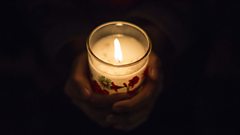Rt Rev Graham James - 06/06/2018
Thought for the Day
Good morning. As a nation we’ve developed the custom of marking tragic events and disasters with one minute’s silence. Nowhere is this more prevalent than in our secondary schools. So much so that yesterday I learned a new term – “silence inflation”. One teacher recalled six occasions within a year when such silences had been observed. Others agreed that the practice had become too frequent, limiting its impact or, worse, causing students to fear a world full of disasters and dangers, and not good for their mental health. An editorial in one of our newspapers argued that rather than keep one minute’s silence in schools it would be better to talk to children about grief, and to invite questions and seek explanations.
I see how one minute’s silence on its own could be a cop out from deeper engagement with a terror incident or some other traumatic event. But it would be a pity if collective silence itself came to be associated only with morbidity. Perhaps our problem isn’t that there’s too much shared silence in our lives but that we no longer know how to use and interpret it.
Our ordinary life experience contains different forms of silence. It’s noticeable how adults frequently fall silent in the presence of the new-born. The gift of life is so overwhelming that words seem redundant. Couples in love discover they don’t have to chatter continuously to know the deepest companionship. And sometimes silence does speak louder than words. I recall John Humphrys asking Archbishop Rowan Williams in an interview recorded for this programme whether the war in Iraq was immoral. The Archbishop was silent for 12 seconds before answering, a radio eternity. The silence became infamous, and spoke volumes.
The Christian tradition has always valued silence in prayer, for reflection and during worship. In the gospels Jesus is frequently recorded as leaving his companions and going to a quiet place to pray. “Silence may be kept” is an instruction common in Anglican liturgies. But when it’s followed congregations can get restive. I’ve sometimes wondered why, and concluded that our inhibition about silence isn’t because we’re fearful of meeting God but much more fearful of encountering ourselves.
Some years ago I used to visit an elderly priest who lived in a tiny flat but was sought out by people from all over the world for his wisdom. He spent long hours in silence and always insisted on at least 15 minutes of shared silence when I called. Silence, he said, needed to be inhabited as one of life’s best gifts.
Duration:
This clip is from
More clips from Thought for the Day
-
![]()
Daniel Greenberg - 14/11/2025
Duration: 02:46
-
![]()
Professor Michael Hurley - 13/11/2025
Duration: 03:05
-
![]()
Rev Roy Jenkins - 12/11/2025
Duration: 03:07
-
![]()
Professor Mona Siddiqui - 11/11/2025
Duration: 02:59






